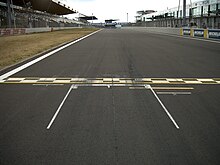
Back Pole position AST Първа стартова позиция Bulgarian Plasenn bol Breton Pole position Catalan Pole position Czech Pole position Danish Pole-Position German Pole position Spanish Pole position Basque پول پوزیشن Persian
This article needs additional citations for verification. (March 2008) |

In a motorsports race, the pole position is usually the best and "statistically the most advantageous" starting position on the track.[1] The pole position is usually earned by the driver with the best qualifying times in the trials before the race, although penalties may award it to the second fastest driver, as the pole position is statistically awarded to the driver starting in first position. The number-one qualifying driver is also referred to as the pole-sitter. The pole position starts the race "at the front of the starting grid. This provides the driver in the pole position the privilege of starting ahead of all the other drivers".[1]
Grid position is typically determined by a qualifying session before the race, where race participants compete to ascend to the number 1 grid slot, the driver, pilot, or rider having recorded fastest qualification time awarded the advantage of the number 1 grid slot (i.e., the pole-position) ahead of all other vehicles for the start of the race. Historically, the fastest qualifier was not necessarily the designated pole-sitter. Different sanctioning bodies in motor sport employ different qualifying formats in designating who starts from pole position. Often, a starting grid is derived either by current rank in the championship, or based on finishing position of a previous race. In particularly important events where multiple qualification attempts spanned several days, the qualification result was segmented or staggered, by which session a driver qualified, or by which particular day a driver set his qualification time, only drivers having qualified on the initial day were eligible for pole position. Some race promoters or sanctioning bodies invert their starting grid for the purpose of entertainment value (e.g., pack racing; to artificially stimulate passing), the slowest qualifier would be designated as pole-sitter.[2][failed verification]
In contrast to contemporary motorsport, where only a race participant is designated pole-sitter, before World War II, the pace car was designated as the official pole-sitter for the Indianapolis 500.
- ^ a b "How Often Does The Pole-Sitter Win In F1?". F1 Chronicle. 2022-07-01. Retrieved 2022-10-29.
- ^ "Pole Position". Lexico Dictionaries | English. Archived from the original on April 11, 2021. Retrieved 2020-02-09.